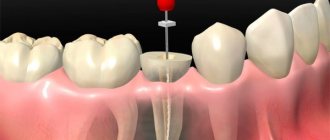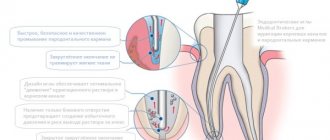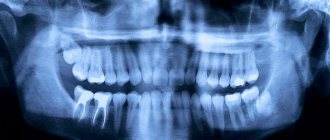Cleaning the tooth canals is a procedure for removing microparticles of the inflamed pulp from the roots, i.e. affected tissues. This is a particularly labor-intensive process, since the final effect of caries treatment depends on the quality of the work.
Clinical case: a patient has caries that has developed into pulpitis. When opening the tooth, the dentist diagnosed an infection and a severe inflammatory process; it was recommended to remove dead pulp tissue from the roots. If the work is not performed perfectly, an infection gets into the roots, a filling is placed on top, and the pathological process already develops under a thick layer of filling material. The toothache does not subside, the patient goes to the doctor again or endures the pain, quenching it with medications, and eventually loses the tooth. That is why, in case of caries, pulpitis and other problems, it is important to contact trusted doctors who perform high-quality root cleaning. It is advisable for the dentist to work with a microscope - multiple magnification allows you to monitor the process of cleaning the canals from remnants of pulp tissue.
One tooth may have two or more tubules, which are localized in the layers of the periodontium. The main task of the canals is to be a connecting link between the crown pulp and the nerves.
More than 10 years ago, deep caries and advanced pulpitis were the reasons for removing a unit, but now, thanks to effective cleaning and treatment of the canals, it is possible not only to preserve the crown, but also to restore its integrity to an ideal result.
When is root canal treatment necessary?
The main goal of the center’s specialists is the restoration and preservation of a tooth that has undergone a pathological process. The task of the dentist-therapist is to clean the canals of the affected tissue and fill them. Without treatment, the infection can spread, affecting nearby tissues. In this case, the tooth is not preserved, and long-term treatment is carried out to eliminate inflammation.
At the Dentpremium center, tooth root canal treatment is carried out only according to the following indications:
- pulpitis is an inflammatory process affecting fibrous and soft tissues supplied with lymphatic and blood vessels, as well as connective tissue and nerve endings;
- periodontitis is an acute inflammation of the tooth root and the tissues surrounding it.
These diseases, as a rule, are a consequence of advanced caries and have symptoms:
- aching, throbbing and acute pain that occurs periodically or due to external influences (for example, when eating);
- discoloration of gum tissue, swelling of the affected area;
- formation of fistulas or pustules on the gums;
- smell of pus from the mouth.
Canal treatment without indications is not performed, since as a result of inflammation and further therapy, the tooth is limited from the vessels and nerve endings that provide its nutrition. This leads to loss of sensitivity and weakening of the tooth.
Expert opinion
Lyubov Ivanovna Kopylova
dentist-therapist
Experience: more than 10 years
If you have the opportunity to go to a dental clinic equipped with an electron microscope, take advantage of it! Even the most experienced dentist works with canals without a microscope by touch. This means that there is a risk of underfilling or, on the contrary, excessive deepening into the canal, leading to perforation. The use of a microscope, when the working field is clearly visualized and the doctor efficiently cleans and seals even the thinnest and most curved canals, will allow this situation to develop.
Features of treatment
Depending on the location in the dentition, the root system has differences, and therefore their treatment has its own characteristics.
Front teeth
The canals of the front teeth in most cases have only one canal, and it is curved, which makes it difficult for instruments to pass through. To preserve the aesthetic appearance of the crown, the tooth is opened from the oral cavity. The use of filling material also has special features - it should not contain dye.
Wisdom teeth
Eights can have up to 5 or more roots. Their root system tends to branch and often gets confused with the roots of neighboring teeth. Due to the complexity of root canal treatment, if the roots are pathologically located, the wisdom tooth may be removed.
Temporary
Treatment of the canals of primary teeth is aimed at stabilizing the root. The procedure is complicated by the natural characteristics of baby teeth. To make fillings, iodoform or zinc oxide eugenol paste is used, which does not have a toxic effect on the rudiments of future permanent teeth. In addition, they are able to dissolve along with the root of the temporary tooth.
Classical treatment methods
Dentistry has long been dealing with the problem of root canal inflammation. Treatment was carried out using two methods:
- opening the tooth chamber, placing arsenic paste, removing it after the tissue has died, and filling;
- opening the dental chamber, placing a resorcinol-formalin mixture, which blocked the inflammatory process, filling.
There are classical and modern treatment methods. When comparing, it can be clearly noted that classical therapy has a number of disadvantages:
- both compositions have a toxic effect on the body;
- risk of incomplete pulp death;
- risk of residual infection and relapse;
- painful procedure.
These methods are now practically not used, since modern means and drugs make it possible to completely clean the inflamed cavity and destroy the infection painlessly, with minimal trauma and without the risk of relapse.
Complications
Cleaning does not always go smoothly. There are unforeseen situations that disrupt its natural course. This means:
- Formation of a hole between the root wall and surrounding tissues. To eliminate the perforation, it is necessary to urgently fill it.
- Severe swelling of the cheek after administration of the anesthetic. This happens if the mucous membrane and periodontal tissues are saturated with an anesthetic drug. After all, by their nature they are quite loose and easily saturated with liquid.
- Breakage of a dental instrument. The probes that are inserted into the canal are very thin. It happens that they break off and remain inside the root. Under no circumstances should you leave them there, as severe inflammation will develop. To remove the fragment, the doctor will use special equipment.
- Allergy to materials used, medications. Anesthetics and drugs used by dentists today very rarely cause allergies. But in order to avoid a dangerous complication, before starting therapy, the doctor collects an allergy history and finds out whether the patient has drug intolerance.
If the patient strictly follows all medical instructions and sits quietly during tooth root treatment, the risk of complications is minimal. Therefore, it is important not to argue with the doctor, not to grab his hands, and not to ignore the prescriptions.
Modern methods of treatment
Highly qualified and experienced specialists at the Dentpremium Dentistry Center use exclusively modern methods of treating inflamed tooth canals.
- Therapeutic or biological. This method allows you to save part of the fabric or the entire remote control. The biological method is effective only at the initial stage of the disease. Treatment consists of placing an anti-inflammatory drug into the pulp chamber with a temporary filling, or applying antibiotic dressings to allow the drug to flow through the dentin.
- Pulp extirpation. Treatment involves removing absolutely all neurovascular tissue, cleaning the cavity, treating with antiseptics and sealing. For treatment, filling, injection of gutta-percha (thermoplasticized) or filling with thermophiles are used.
In the most severe cases, when there is a cyst, granuloma or other formation, resection of the root apex is performed.
Stages of treatment
The Dentpremium Center provides dental canal treatment in stages. At the first appointment, the endodontist conducts an examination and diagnosis.
If root canal inflammation is suspected, radiography must be performed to determine the location of the lesion. Additionally, a computed tomography or orthopantomogram may be performed. After receiving all the data, the doctor determines the method of therapy.
Main stages of endodontic treatment.
- Pulpectomy. The endodontist anesthetizes the affected area, opens the tooth, and removes all necrotic and inflamed tissue. Giving the desired shape to the channels. Antiseptic treatment.
- Filling. Hermetically filling open cavities with a high-quality and safe filling composition: plastic (paste, gutta-percha), hard (pins) or hardening (cement materials). Filling using hot gutta-percha is considered the most effective.
- Crown restoration. The specialist’s task at this stage is to restore the anatomical shape of the tooth. For this, a filling (direct method) or a crown (indirect method) is used.
In case of inflammation of the dental canals, treatment is performed using strong anesthetics. Insufficient anesthesia can lead to pain, since the dental canals and pulp are connective and soft tissues equipped with nerve receptors.
At the Dentpremium clinic, specialists use only modern anesthetic drugs, which effectively anesthetize the area where the endodontist works for 2 hours. Treatment lasts from 30 minutes to 1 hour. In severe cases, it can take up to 2 hours. If sensation is restored during the procedure, another injection of anesthetic may be given.
Life time
The service life of a temporary filling varies from 3-4 days to 2-3 weeks. The exact timing depends on the specific dental disease and the drugs used in treatment.
Here's how much a temporary filling can cost in different situations:
- when using arsenic paste to kill a diseased nerve - no more than 2-3 days (usually 24-28 hours), when using other means (for example, paraform paste) for the same purposes - 5-10 days;
- when using antibiotics and antiseptics in the treatment of deep caries or pulpitis - from 3-4 days to 2-3 weeks;
- in particularly complex diagnostic cases – up to 3 and even 6 months.
If you can’t get to the doctor on time, be sure to notify him in advance. In this case, if possible, he will try to place the most durable reflective filling that can be safely worn for several months.
Recommendations
Endodontic treatment at the Dentpremium clinic has high success rates. However, to prevent complications arising due to improper dental care after therapy, the following recommendations should be followed:
- exclude spicy, hot and cold foods from the diet for 3–5 days;
- maintain oral hygiene (brush your teeth, use an irrigator and dental floss);
- do not chew gum and hard foods, do not chew candies, nuts, etc.
In order to prevent pathological processes in the roots of the tooth, it is necessary to visit the dentist twice a year for preventive purposes, as well as to promptly treat diseases of the oral cavity.
Note! Increased sensitivity and minor pain in the first days are normal. If the pain is severe, you should contact your dentist.
After the procedure
In the first few hours after the procedure, the patient may experience slight swelling and soreness of the tissues around the prepared tooth, which can be easily relieved with painkillers:
- Nurofen . Designed to relieve pain of moderate intensity. 1 tablet is allowed no more than 5 times per day. Price – 250 rubles.
- Askofen is a fast-acting combination drug containing caffeine and paracetamol. The drug is taken 1 tablet up to 4 times a day. It costs about 140 rubles.
- Ketorol - designed to relieve severe pain. To do this, it is recommended to take 1 tablet 3 times a day. The price of the drug is 90 rubles.
Cost of treatment
Dentistry Dentpremium is a center of expert medicine that provides professional services at affordable prices. For dental canal treatment, the cost is calculated taking into account several factors: the number of root canals, the method and materials used, the total volume and complexity of the specialist’s work.
On the clinic’s website you can see the price list, which indicates the average cost of root canal treatment. After an examination in the dentist’s office and receipt of diagnostic results, the attending physician will be able to announce what the final cost for root canal treatment will be.
On the website of the Dentpremium clinic you can find all the information you are interested in, make an appointment or a free consultation, and also read reviews about root canal treatment in our center. If you have any questions, you can contact us by phone.











